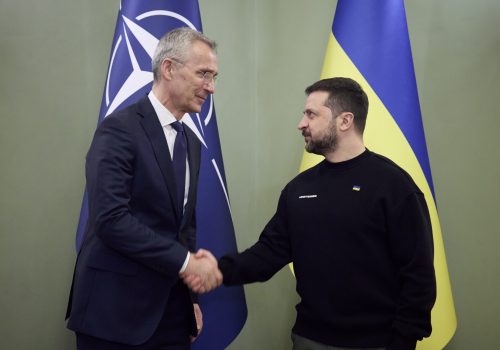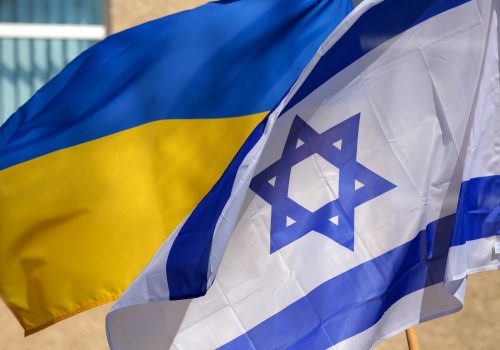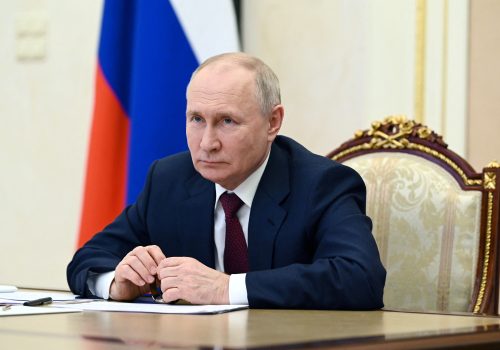Dispatch from Vilnius: Will Zelenskyy show at the summit? It depends on whether Biden listens to frontline NATO allies.
VILNIUS—Here’s an easy way to judge the success of NATO’s summit here on Tuesday and Wednesday: Will President Volodymyr Zelenskyy join the traditional “family photo” of the Alliance’s thirty-one leaders?
“The summit has only one essential outcome,” Doug Lute, a former US ambassador to NATO and member of the Atlantic Council’s board of directors, told me. “Whatever the agreements on supporting Ukraine, this year it is essential that Zelenskyy be in the photo, capturing vividly that NATO has his back and reminding the world that Russia has no such support.”
Beyond that, if the Ukrainian leader is photographed standing among the thirty-one NATO heads of state, Zelenskyy more than likely got enough of what he needed to make the trip to Lithuania. When I met with him recently in Kyiv, as part of an Atlantic Council delegation, he said anything short of security guarantees and a clear roadmap to NATO membership for Ukraine would be seen as a betrayal of Ukrainians’ sacrifice.
If Zelenskyy doesn’t come to Vilnius, allied leaders will have missed a crucial opportunity to signal to Ukrainians and the world their unflinching commitment to defeating Russian leader Vladimir Putin’s criminal war and revanchist designs in Europe—at a crucible moment in the five-hundred-day-old war.
Zelenskyy was in Turkey on Saturday as part of a pre-summit European tour, shoring up support from Turkish President Recep Tayyip Erdoğan, who is still withholding his support for Sweden’s membership in NATO. Regarding Kyiv, however, Erdoğan said: “There is no doubt that Ukraine deserves NATO membership.”
Though much still could change before the summit opens on Tuesday, Central European alliance members say that the Biden administration has led the recalcitrance to a stronger, time-linked roadmap to NATO membership for Ukraine.
One Central European senior official, who asked that his name and that of his country not be named, compared the tone coming from the White House to that of Jacques Chirac in 2003, when the French president lectured Central Europeans who were supporting the United States on Iraq that they had “missed a good opportunity to shut up.”
What’s on the table for Ukraine thus far in Vilnius is, among other measures, the renaming of a NATO consultative group to give it more weight, security assurances similar to those the United States has with Israel, and the removal of the bureaucracy of a membership action plan (MAP)—though US National Security Advisor Jake Sullivan said on Friday that Ukraine “needs to take additional reforms,” hinting that it will still face a MAP-like process. Zelenskyy told us in Kyiv that such moves would be insufficient given his country’s service to democracies everywhere.
To be sure, the Biden administration deserves high praise for its handling of Russia’s war thus far, starting with its early leaking of intelligence predicting the invasion so that Ukraine and Europe were forewarned (not to mention China). Without concerted US military and financial support, Ukraine likely would have failed.
At the same time, if Ukrainians had received the weaponry and equipment they wanted faster and in greater quantities, thousands of Ukrainians would still be alive and the battlefield gains would have been greater.
Softening the potential blow of a disappointing summit outcome for Ukraine, the Biden administration cleared the way this week to provide Ukrainians with the cluster munitions they have long sought, prompting Zelenskyy to praise Biden’s “decisive steps.”
A form of air-dropped or ground-launched explosives that release smaller submunitions, cluster munitions have been widely used by Russia but are outlawed by many allies, though not by the United States. With Ukraine running low on 155 mm artillery shells, which are in low supply globally, cluster munitions are the fastest, most plentiful way to flush out dug-in Russian positions that are blocking the Ukrainian counteroffensive.
The Biden administration’s green light for cluster munitions has followed a pattern: The White House at first blocks the provision of certain weapons, from High Mobility Artillery Rocket Systems (HIMARS) and Abrams tanks to Patriot air defenses, only to agree to their provision months later. The administration’s go-slow approach to Ukraine’s NATO membership aspirations reflects that caution, born of a desire to defend Ukraine without provoking greater Russian escalation, including tactical nuclear weapons use.
All NATO summits have to balance the longer-term needs of the Alliance with immediate demands. However, officials from non-US NATO member countries who I spoke to last week said there are several reasons why Ukraine’s immediate needs should take on greater priority:
- Mercenary leader Yevgeniy Prigozhin’s short-lived rebellion in June underscored both the fissures in Russia’s leadership and the low morale and discipline of its military. It’s thus an ideal time to double down on support for Ukraine, recognizing that only significant ground gains can force useful negotiations.
- Despite the economic and military cost of supporting Ukraine, the costs will grow exponentially if Putin prevails, and the threats go beyond Ukraine. One Biden administration official told me that the geopolitical importance of Ukraine to Washington is far greater than either Afghanistan or Iraq ever was, yet Ukraine can stop Russia at far lower cost and without risking American or other allied soldiers.
- To argue that NATO membership for Ukraine can only come after the war ends and Russia leaves Ukrainian territory only provides Moscow an incentive to continue the war. Holding back due to concern about Russian nukes rewards Putin’s nuclear blackmail—and will encourage other unsavory leaders to acquire nukes as well.
- Much is said about why Ukraine needs NATO, but not enough is said about why the Alliance needs Ukraine, now one of the strongest and most battle-hardened militaries in the world. The lesson of NATO in Central and Eastern Europe is that it brings stability to its neighbors and more peaceful and secure relations with Russia. The countries that Russia invaded—Georgia and Ukraine—were gray zones outside any military alliance. “Gray zones are green lights” for Putin, argues former US ambassador to NATO Kurt Volker.
- Putin thus far has been wrong to count on Ukrainian failure and Western fatigue, but the dangers will grow in 2024 when the United States and much of Europe face elections. Bold decisions that can be made in 2023 will be much more difficult to achieve next year. Ukraine’s biggest threat might be the election year of 2024, and not just in the United States.
“We don’t any longer have the luxury of time,” one senior European official told me. “We certainly don’t have the luxury of getting it wrong. The stakes are too large—they are generational and go far beyond NATO’s borders.”
Frederick Kempe is president and chief executive officer of the Atlantic Council. You can follow him on Twitter @FredKempe.
THE WEEK’S TOP READS
#1 The war in Ukraine shows how technology is changing the battlefield
ECONOMIST
The Economist breaks down the lessons of the Ukraine war and what they mean for the future of warfare. Read the whole report to gain a deep and nuanced understanding of the implications for future military planning.
“[T]he paradox of the war,” the Economist writes, “is that mass and technology are intimately bound together. Even the artillery war shows this. Weeks before the invasion, America sent Ukraine Excalibur shells. Inside each was a small, rugged chip that could receive GPS signals from America’s constellation of navigation satellites. Whereas Russia often relied on barrages over a wide area, Ukrainian gunners could be more precise.”
This, the Economist argues, portends a shift towards the defensive, analogous to the late nineteenth century. “Precision warfare can counter some advantages of mass: Ukraine was outnumbered 12 to one north of Kyiv. It can also complement mass. Software-based targeting saves around 15-30% in shells, according to sources familiar with the data. But what precision cannot do, says Michael Kofman of the Centre for Naval Analyses (CNA), a think-tank, is substitute for mass.” Read more →
#2 Ukraine wants and expects an invitation to join NATO. Allies are not sure.
David L Stern, Emily Rauhala, and Isabelle Khurshudyan | WASHINGTON POST
For an understanding of what Ukraine seeks at the upcoming NATO summit in Vilnius, what might happen, and what the Ukrainians are worried about, read this excellent piece of reporting from David Stern, Emily Rauhala, and Isabelle Khurshudyan in the Washington Post.
“With or without membership,” they write, “Ukrainian officials are looking for security commitments by Western nations ‘without delay and as soon as possible,’ which would potentially encourage Moscow to withdraw its forces. Many analysts say Russian President Vladimir Putin is counting on Ukraine’s Western supporters to grow exhausted and halt the expensive flow of weapons and economic aid they have been sending to Kyiv. Such security guarantees could also serve to deter Russia from any major acts of aggression in the future. ‘I am sure that if the regime in the Kremlin does not change in the coming years, even after our victory, there will be — in their heads — a desire for revenge,’ [Ukrainian Defense Minister Oleksii] Reznikov said.” Read more →
#3 Putin’s Real Security Crisis
Andrei Soldatov and Irina Borogan | FOREIGN AFFAIRS
For another angle on the implications of Prigozhin’s failed coup, read this smart analysis of the failure of the Russian security services during the coup and Putin’s apparent non-response to that failure.
“Then, as Wagner forces made their move,” Soldatov and Borogan write, “both the FSB and Russia’s National Guard, the main body assigned to maintain internal security and suppress unrest in Russia, failed as rapid response forces. The National Guard made every effort to avoid a direct confrontation with Wagner; for its part, the FSB—which also has several elite special forces groups—did not appear to take any action at all. Instead, the most powerful security agency in the country issued a press release calling on Wagner’s rank and file to stay out of the uprising and to go arrest Prigozhin—on their own.”
And yet, they note, no one has yet been punished.
“This lack of repercussions for the security services is particularly startling in view of the FSB’s performance in the crisis. When Prigozhin captured the headquarters of the Southern Military District—where he spoke to [Deputy Minister of Defense Yunus-Bek] Yevkurov and [First Deputy Head of the GRU Vladimir] Alekseyev—it looked almost like a hostage taking of several of Russia’s top military commanders. Yet according to sources in the FSB, in response to the arrival of Wagner forces, the FSB agents in Rostov-on-Don simply barricaded themselves in their local headquarters… While a column of Wagner mercenaries marched toward Moscow, taking down helicopters and shooting into the houses of civilians on the way, these brave generals failed to show up—not at the scene or in front of the public at all.” Read more →
#4 Multilateral Man Is More Powerful Than Putin Realized
Anne Applebaum | THE ATLANTIC
In this must-read profile of NATO Secretary General Jens Stoltenberg, Anne Applebaum makes a powerful case for why Stoltenberg’s brand of quiet multilateral leadership will ensure Ukraine’s long-term integration into Europe from behind the scenes.
“[A]lthough historians will argue about whether NATO countries could have done more to deter Russia, they did much more to help Ukraine than Putin expected once the war began. Putin not only underestimated Ukraine; he also underestimated Multilateral Men—the officials who, like Jens Stoltenberg and his counterparts at the European Union, helped the White House put together the military, political, and diplomatic response. Putin believed his own propaganda, the same propaganda used by the transatlantic far right: Democracies are weak, autocrats are strong, and people who use polite, diplomatic language won’t defend themselves. This turned out to be wrong. “‘Democracies have proven much more resilient, much stronger than our adversaries believe,’ Stoltenberg said. And autocracies are more fragile: ‘As we’ve just seen, authoritarian systems can just, suddenly, break down.’” Read more →
#5 Evan Gershkovich, Detained for 100 Days
WALL STREET JOURNAL
As a former Wall Street Journal reporter and longtime advocate for press freedom, I remain determined to do what’s possible to end the Russian imprisonment of WSJ reporter Evan Gershkovich, which is now at one hundred days and counting. I urge Inflection Points readers to follow the WSJ’s guide on what you can do to support Evan and his family.
Writes Emma Tucker, the WSJ’s editor-in-chief, “In the days since Evan was arrested we have been inspired by the support that you, our readers, have provided. It has helped us to keep Evan’s plight at the top of the news agenda. As we reflect on this difficult milestone, we encourage you to continue sharing Evan’s reporting and the latest updates on his situation. Journalism is not a crime, and we will not rest until Evan is released.”
Amen. Read more →
Atlantic Council top reads
Image: Handout photo shows Ukrainian President Volodymyr Zelensky addresses a press conference during his meeting with the Czech President in Prague Castle in Prague, Czech Republic, on July 6, 2023. "We need honesty in our ties," Zelensky told reporters alongside Czech President Petr Pavel, speaking ahead of a key summit in Vilnius. Zelensky called on Nato leaders to take concrete steps towards Ukrainian membership at a summit next week, and he received support during a visit to Prague from the Czech president, who backed Kyiv’s bid to join the alliance. Photo by Ukrainian Presidency via ABACAPRESS.COM


